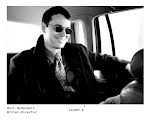---------------------------------------Nelson Algren
Reading Richard Lindberg's illuminating and very lively book,
Chicago by Gaslight, I can't help but being amazed at how
radical the lower middle class - to use an anachronistic term -
once was in America. In 1879, a labor meeting in Chicago
could draw over 30,000 people to commemorate the
Paris Communards.
But where are these people in our memory?
Certainly the descendents of these 30,000 - and of the
100,000s there must have have been nationally - still walk the
streets of the nation, or I should say drive the streets of our
subdivisions. But how many of these descendants have any
idea that their own great grandfathers went to rallies and
cheered the speakers exhorting them to destroy capitalism?
How many Presbyterians, even in Chicago, know that the rising tensions
in Chicago which led to the Haymarket Riots are intimately tied with the
founding of the McCormick Theological Seminary?
When Cyrus Hall McCormick, son of the inventor of eponymous reaper,
took over the McCormick Reaper Works on his father's death*, he cut
the pay of his workers while simultaneously giving huge amounts of money
to Chicago's Presbyterian Seminary. Most of his workers were Catholic
and of course there is no love lost between these two tribes, so the tension
rose to levels which proved to be lethal when his workers learned of
the large bequest and compared it to their own penury.
My guess is that, today at least, most of the sympathy of those at
the McCormick Theological Seminary, both students and faculty
members, would lie with the workers, not the owner.
But of course ministers and professors, churches and universities need
money too, so it's McCormick for whom the Presbyterian Church names
its most important seminary and not Albert Parsons who returned
voluntarily to Chicago to be crucified; and it's not Robert
Sengstacke Abbott who founded the Chicago Defender
whose name graces the School of Journalism at Northwestern
University, but that of Joseph Medill, who once wrote an editorial in
his Chicago Tribune advocating the poisoning of homeless men,
" [as] a warning to other tramps to keep out of the neighborhood...."
In effect the rich buy a good memory of themselves, and we as
Americans, as people of faith, as those who in the end, alas,
believe in success as much as we believe in anything, accept this.
Nelson Algren sums it up in Chicago, City on the Make: our
institutions - that is the expressions of our common identity
and purpose, in the arts, in matters of faith, in education
- in the end they all serve as "Mere monuments to the luckier
brokers of the past."
* It should not be thought his father had significantly better relations
with workers. The elder McCormick financed
the acquisition of gatling machine guns for the Illinois National Guard
in case they had to protect him from... his own workers.
__________________________ +

1 comment:
I wrote an article about Bill Adelman the "People's Historian" who died here last year
http://wjinc.com/main.aspSearch=1&ArticleID=17535&SectionID=1&SubSectionID=1&S=1
Most of the "instigators" were Germans who had a thick community of beer hall compatriots -- and several local newspapers -- they could get a crowd together in a hurry. I asked Tom Goegeghan whether Facebook and Myspace could provide a new virtual beerhall for the labor unions. He was skeptical.
Post a Comment